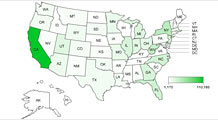Demand down for foreign worker visas
That's good news for small companies that have found themselves shut out of the annual H-1B visa lotto in past years.
 |
| Kevin Chou hopes the third time will be the charm for scoring an H-1B visa for a Canadian worker at his company. |
NEW YORK (CNNMoney.com) -- Kevin Chou has had his fair share of visa woes. For the past two years running, his Silicon Valley social networking start-up, Watercooler, has applied for an H-1B work visa for the same Canadian employee. Both times, the petition lost out in the government's annual visa lottery, which selected only 85,000 from a pool of more than 120,000 hopefuls.
"We've flushed $10,000 down the drain on H-1Bs," says a disenchanted Chou, who last year was unable to offer a job to a highly-skilled software engineer from India because he was worried that engineer would face the same problem. The candidate ended up taking a position at Google (GOOG, Fortune 500).
Watercooler's story is not atypical for small businesses, which usually have fewer resources to throw at the application process and no foreign offices in which to temporarily place talented candidates awaiting visa approval. As a result, many are disproportionately affected by the cap on H-1Bs. But this year, analysts say, could be different.
Immigration experts expect H-1B applications for 2009 to be at their lowest levels in years. Some even suggest that after April 1, the first day on which applications may be filed, it could take a week or more to fill the quota of 85,000 visas. (65,000 visa spots are open to all applicants, while an additional 20,000 are earmarked for those with graduate degrees from U.S. universities.) In past years, it's taken as little as 48 hours for the queue to fill up.
A combination of factors are behind this year's reduced demand, including the slowing economy, new restrictions on H-1B hiring at some firms, and the accounting scandal that has weakened massive Indian outsourcing firm Satyam Computer Services. The end result: Smaller firms have the best chance they've had in years to score an H-1B.
"If you're lucky enough to be in hiring mode, this is the year to apply," says Greg Siskind, an immigration attorney and blogger, who notes that the number of work visa applications always dips during a recession. Other attorneys say they're filing half as many applications as they did last year, as their clients cut costs or downsize.
That's good news for small business owners such as Aleksandar Ivanovic, CEO of Milwaukee software firm Webcom. He's not in the habit of applying for H-1Bs, but last year he decided that a talented intern of Nigerian citizenship was worth the investment of $5,000 for filing and attorney fees. The petition failed.
"It's frustrating because it's not easy to find bright kids," says Ivanovic. His company has unusually high standards when it comes to recruiting, even for internships; he requires at least a 3.9 GPA. This particular candidate was the only one who made it through a tough application process in 2007. Ivanovic hired him - the intern's student visa allows him to accept limited employment for training purposes. A more recent internship recruitment effort at Webcom drew close to a hundred applicants, but none of them made it through.
That's why Ivanovic is petitioning for an H-1B again this year for the same Nigerian intern, whom Ivanovic says has exceptional math and Boolean logic skills that Webcom hasn't found in any other candidates. Ivanovic would like to keep the staffer after his student visa runs out. He's happy that his chances of scoring the H-1B have dramatically improved.
It's not just the slowing economy that's depressing H-1B visa demand. A protectionist provision in the recently passed federal stimulus program has made it harder for financial institutions receiving federal funds to apply for H-1B visas for the next two years.
While individual U.S banks haven't been big H-1B petitioners in the past, their combined impact is significant. According to the National Foundation for American Policy, a nonpartisan immigration research think tank in Arlington, Va., twelve of the banks that have received funding from the government's Troubled Asset Relief Program (TARP) submitted a combined total of more than 900 H-1B petitions in 2007. That's a minuscule percentage of the more than 1.2 million workers the banks employed, but it's a noticeable chunk of the H-1B application pool.
Then there's Satyam, the Indian software firm currently under investigation for massive accounting fraud. In 2008, Satyam was the third-largest petitioner for H-1B visas, submitting a total of nearly 2,000 petitions, according to the U.S. Citizenship and Immigration Services.
Following the recent scandal, analysts such as Sam Udani of Immigration Daily, an immigration news Web site, expect the company to file far fewer applications this year. Satyam recently told the New York Times that it is withdrawing many Indian employees from the U.S. and sending them back to India.
"If you apply for an H-1B this year, there's close to a 100% chance that you'll get it," Udani says.
Watercooler's Chou says he has no choice but to try again this year. His foreign employee has remained with the company for the past two years on a special TN1 work visa for Canadians, but it costs $2,000 for the company to renew each year, with no guarantee that the next year's renewal will be granted.
Finding an American employee to replace his Canadian staffer wouldn't be easy, Chou says. Part of a seven-person software engineering team, she started at Watercooler within months of the company's launch and has deep institutional knowledge to draw on - plus fluency in LAMP (Linux, Apache, MySQL, PHP) and the application development platforms that underpin social networking sites Facebook and MySpace.
"Finding that type of skill set is not easy. It's very specialized," says Chou. He estimates that finding and training a replacement would take at least six months and amount to more than $50,000 in expenses.
This year's better H-1B odds give Chou hope, but after losing out the past two years, he's not holding his breath. "It's still a $5,000 bet," he says. ![]()
Related stories:
In one town, recession helps bridge cultural rift
Letting the last staffer go
H-1B visa crunch: 'I can't grow my business'
How illegal immigration is dividing a town's business owners
-
The Cheesecake Factory created smaller portions to survive the downturn. Play
-
A breeder of award-winning marijuana seeds is following the money and heading to the U.S. More
-
Most small businesses die within five years, but Amish businesses have a survival rate north of 90%. More
-
The 10 most popular franchise brands over the past decade -- and their failure rates. More
-
These firms are the last left in America making iconic products now in their twilight. More










